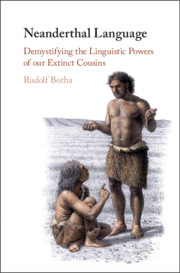Book contents
- Neanderthal Language
- Neanderthal Language
- Copyright page
- Contents
- Figures
- Images
- Acknowledgements
- Copyright Permission for Images
- Part I Preliminaries
- Part II Symbolic Behaviours
- Part III Non-symbolic Behaviours
- 8 Making Stone Tools
- 9 Teaching Stone-Tool Making
- 10 Hunting Big Game
- Part IV Implications
- Notes
- References
- Index
10 - Hunting Big Game
from Part III - Non-symbolic Behaviours
Published online by Cambridge University Press: 26 April 2020
- Neanderthal Language
- Neanderthal Language
- Copyright page
- Contents
- Figures
- Images
- Acknowledgements
- Copyright Permission for Images
- Part I Preliminaries
- Part II Symbolic Behaviours
- Part III Non-symbolic Behaviours
- 8 Making Stone Tools
- 9 Teaching Stone-Tool Making
- 10 Hunting Big Game
- Part IV Implications
- Notes
- References
- Index
Summary
Chapter 10 appraises the hunting inference about Neanderthal language. Starting from data about Neanderthals’ ambush hunting, this inference comprises in outline three inferential steps: Neanderthals’ ambush hunting had the features F1, F2, F3 and F4 → This hunting required cooperation → This cooperation required communication → This communication required language. [F1 = The hunting was confrontational; F2 = The prey comprised large animals; F3 = Heavy carcasses had to be transported; F4 = Bands of hunters were divided into a tracking/driving and an ambushing group.] The first inferential step is underpinned by the assumption that hunters had to cooperate in planning ambushes, killing dangerous prey etc.; the second step by the assumption that such planning required communication about effective hunting strategies, coordinated action etc.; the third step by the assumption that such communication required ‘labels’ or ‘words’ for referring to features of the landscape, routes, hunting sites etc. These assumptions are reasonable. But it is unwarranted to infer that (a) to be successful, such communication required complex grammar; and (b) that any such communication was not gestural.
- Type
- Chapter
- Information
- Neanderthal LanguageDemystifying the Linguistic Powers of our Extinct Cousins, pp. 128 - 138Publisher: Cambridge University PressPrint publication year: 2020

